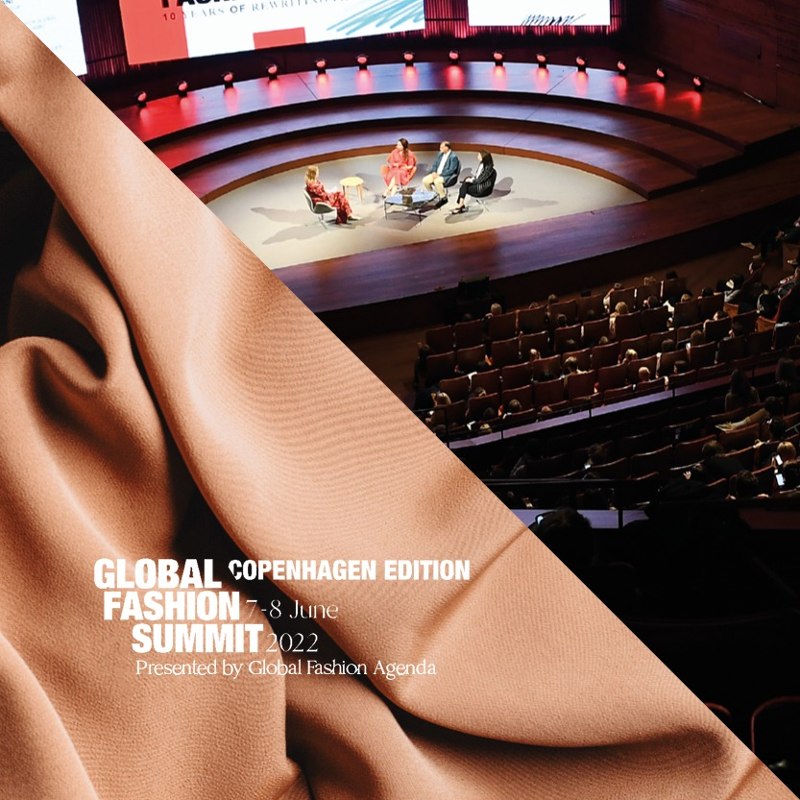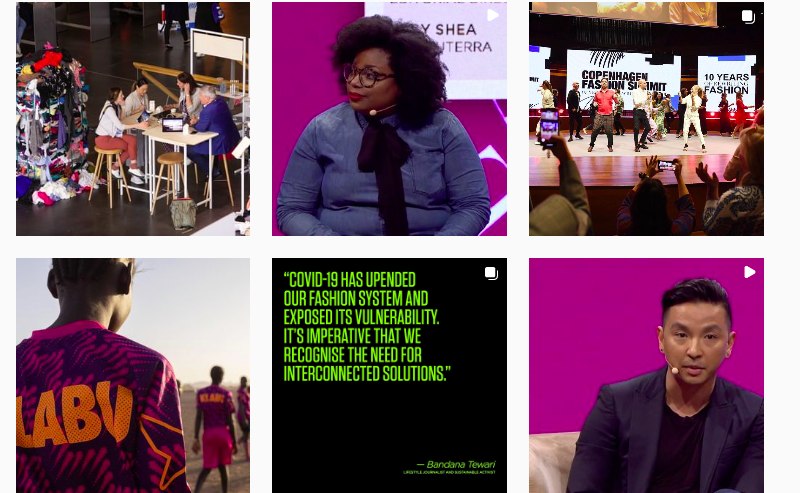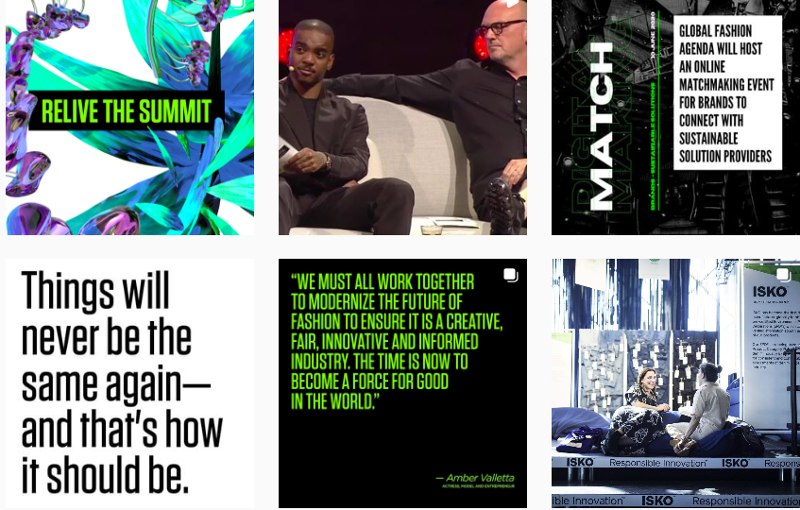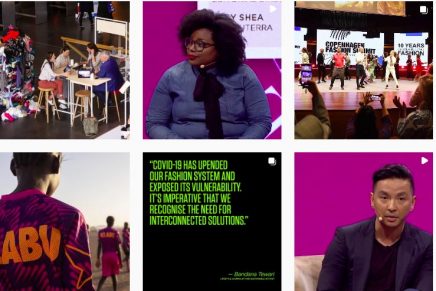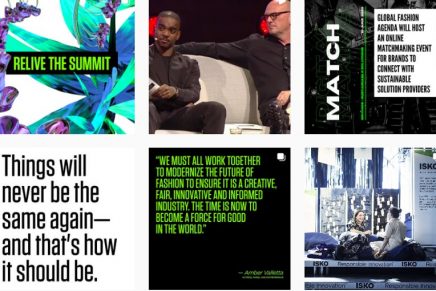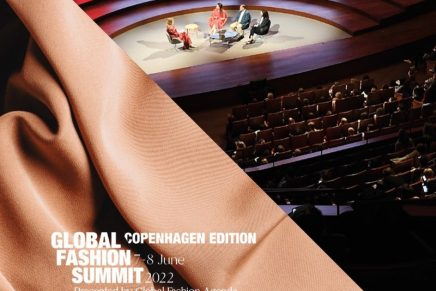Global Fashion Summit: Copenhagen Edition is the epicentre for sustainability in fashion. Illustrious brands and organisations launch new initiatives to accelerate impact.
Hosted in the grand setting of the Royal Opera House, Copenhagen, on 7-8 June, the sustainable fashion event convened over 900 leaders from brands, retailers, NGOs, policy, manufacturers, and innovators to drive urgent action. The Summit was presented by Global Fashion Agenda (GFA), the non-profit organisation that is accelerating the transition to a net positive fashion industry, under the patronage of HRH The Crown Princess of Denmark.
2022 Global Fashion Summit was centred around the theme ‘Alliances for a New Era’. Under the theme, the event brought together leaders to foster pre-competitive collaboration within the fashion industry and examined atypical cross-industry alliances, in a bid to accelerate the transition to a net positive industry.
The content was designed to be the boldest yet and focused on challenging topics and honest discussions with more diverse voices. The programme covered topics from ‘What even is a sustainable brand?’ to ‘subverting fashion’s historical exclusion’, to ‘supercharged storytelling’ to the ‘metaverse impact and decentralised futures’.
Attendees heard from 112 speakers including HRH The Crown Princess of Denmark; Marie-Claire Daveu, Chief Sustainability & institutional Affairs Officer, Kering ; Leo Rongone, CEO, Bottega Veneta; Thierry Andretta, CEO, Mulberry; Lily Cole, Author & Podcaster on climate solutions and Advisor for UNECE; Nicolaj Reffstrup, Founder, GANNI; Maximillian Bittner, CEO, Vestiaire Collective; Paul Polmon, Co-Author, Net Positive; Bobby Kolade, Fashion Designer; Halide Alagöz, Chief Product Officer, Ralph Lauren Corporation; Aditi Mayer, Sustainable fashion blogger and labor rights activist; Lindita Xhaferi Salihu, Fashion Charter Lead, UNFCCC; and many more.
“Fashion is about change, you can let it happen, or you can make it happen. The Summit sparked many very promising alliances and we saw key stakeholders announce a flood of encouraging sustainability improvements. There has been so much knowledge shared and attendees now need to take what they have learned and share it with others, and – most importantly – implement it, diligently” – Federica Marchionni, CEO, Global Fashion Agenda.
Leading brands, retailers and organisations unveiled new alliances and initiatives:
Multiple companies chose to announce their latest sustainability measures at the landmark event. Highlights include:
GFA published The GFA Monitor – a new report to guide fashion leaders towards a net positive fashion industry. It presents consolidated guidance according to five core sustainability priorities. Building alliances through shared industry knowledge, each priority includes expert insights from GFA’s Data Partner, Higg, and its Impact Partners including: Fair Labor Association (FLA), the Social & Labor Convergence Program (SLCP), Ellen MacArthur Foundation, Apparel Impact Institute, and Textile Exchange.
GFA also announced the launch of the Global Circular Fashion Forum (GCFF), a global initiative, which will be supported by GIZ, to spur local action in textile manufacturing countries to accelerate and scale recycling of post-industrial textile waste. The forum will convene stakeholders across various circularity programmes and regions, sharing knowledge and building upon best practices in an effort to achieve a long-term, scalable, and just transition to a circular fashion industry. The GCFF builds on the Circular Fashion Partnership in Bangladesh (2020-2021) that demonstrated the potential to scale the recycling of post-industrial textile waste to create new textiles. It will aim to establish similar locally owned and led programmes in other regions, beginning in Vietnam and Cambodia.
Ralph Lauren Corporation announced its new Live On promise to enable its past and future products to live on responsibly by 2030. The new promise is part of Ralph Lauren’s Timeless by Design approach to ensuring its philosophy of timelessness is embedded from inspiration through to products’ every use and re-use across generations. As part of the unveiling, the Company also revealed that its iconic cashmere sweater will be the first-of-its-kind luxury Cradle to Cradle (C2C) Certified® product.
Apparel Impact Institute announced the lead funders for a new $250M Fashion Climate Fund: Lululemon, H&M Group, H&M Foundation, and The Schmidt Family Foundation. Uniting corporate entities and philanthropy, the fund will help decarbonize and modernize fashion industry supply chains.
Fashion Revolution highlighted its new “Good Clothes, Fair Pay” campaign which calls for legislation on living wages across the garment sector. This year-long campaign will be the single biggest EU campaign on living wages to date, requiring 1 million signatures from EU citizens.
Danish affordable luxury brand GANNI launched three fabric innovations as part of their ‘Fabrics of the Future’ initiative, an ambitious in-house programme dedicated to researching and developing innovative materials that will help inform the transition towards a more circular and lower impact fashion industry.
TrusTrace, a platform for supply chain transparency and product traceability within the fashion and retail industries, in collaboration with Fashion Revolution and Fashion for Good, unveiled The Traceability Playbook. The comprehensive, open-source guide offers an in-depth analysis of the evolving market dynamics and incoming legislation moving traceability from a nice-to-have to a must-have, and includes practical advice on how to leverage traceability to achieve their goals.
British luxury lifestyle brand, Mulberry, announced the introduction of Digital IDs to its leather goods in an initiative to revolutionise the way luxury brands and customers connect, and steward circularity in luxury fashion. As part of Mulberry’s commitment to introduce Digital ID to all products by 2025, Mulberry begins digitisation of pre-loved and vintage bags from Mulberry’s circular economy programme, the Mulberry Exchange – connecting each bag with a Digital ID powered by EON, retail’s leading enterprise software Product Cloud platform.
In continuation of a round table at the Summit on Establishing Circular Fashion Systems in Indonesia, the Indonesian G20 Presidency, the EU, the Italian Ministry of Ecological Transition and the Indonesian Chamber of Commerce, will host a workshop to explore formats for international cooperation and exchange to help drive circular fashion throughout G20 value chains.
22 textile manufacturers that are members of Net Zero Pakistan – and represent 15% of Pakistan’s exports – convened to discuss how Pakistan’s textile industry can collaborate with global fashion brands to identify and scale sustainable interventions across the supply chain. They are working together to drive the decarbonisation of the global fashion and apparel supply chain.
Innovation Forum connected fashion companies with sustainable solution providers
This year’s Summit also presented an Innovation Forum, enabling small and large companies to meet with 24 sustainable solution providers – equipping them with the tools to turn words into meaningful actions. More than 300 facilitated business meetings between fashion companies and sustainable solution providers took place during the two days of the Summit.
Global Fashion Summit: Copenhagen Edition 2022 was supported by Principal Sponsor, Polestar. Formerly known as Copenhagen Fashion Summit, the forum was renamed in February 2022 to manifest the organisation’s global outlook and reach. Global Fashion Summit will build on the 13-year history of the renowned Copenhagen Fashion Summit by strengthening its representation and connections with diverse perspectives from across the world. Therefore, the Summit will be hosted in various key cities in the future, in addition to its flagship edition in Copenhagen.

